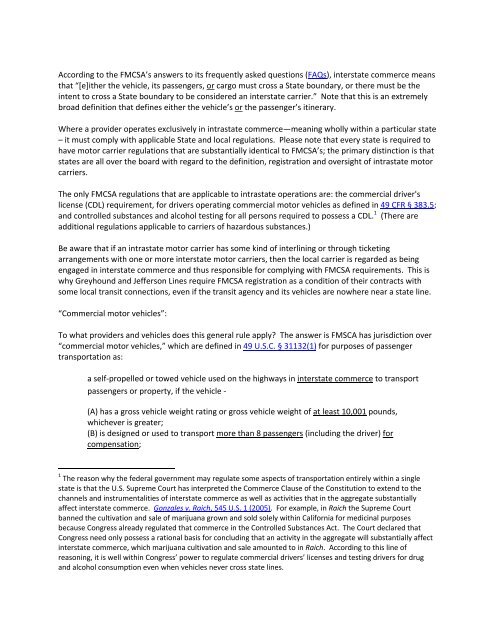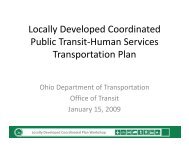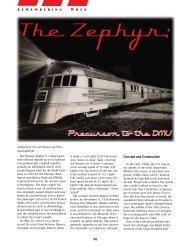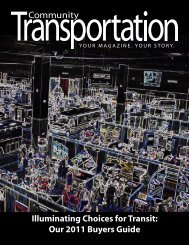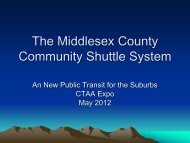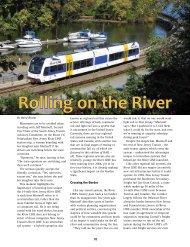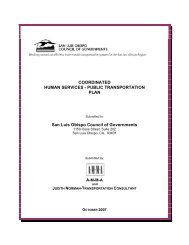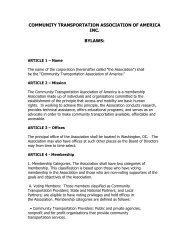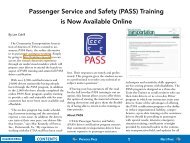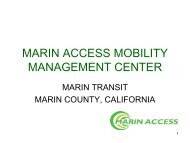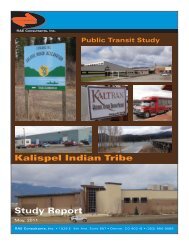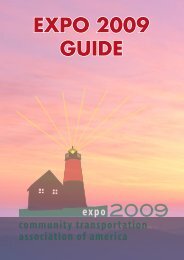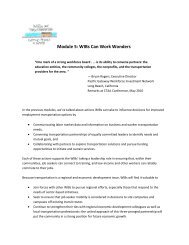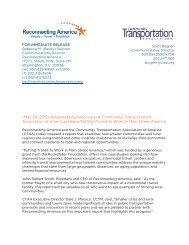FMCSA - The Community Transportation Association of America
FMCSA - The Community Transportation Association of America
FMCSA - The Community Transportation Association of America
You also want an ePaper? Increase the reach of your titles
YUMPU automatically turns print PDFs into web optimized ePapers that Google loves.
According to the <strong>FMCSA</strong>’s answers to its frequently asked questions (FAQs), interstate commerce meansthat “[e]ither the vehicle, its passengers, or cargo must cross a State boundary, or there must be theintent to cross a State boundary to be considered an interstate carrier.” Note that this is an extremelybroad definition that defines either the vehicle’s or the passenger’s itinerary.Where a provider operates exclusively in intrastate commerce—meaning wholly within a particular state– it must comply with applicable State and local regulations. Please note that every state is required tohave motor carrier regulations that are substantially identical to <strong>FMCSA</strong>’s; the primary distinction is thatstates are all over the board with regard to the definition, registration and oversight <strong>of</strong> intrastate motorcarriers.<strong>The</strong> only <strong>FMCSA</strong> regulations that are applicable to intrastate operations are: the commercial driver'slicense (CDL) requirement, for drivers operating commercial motor vehicles as defined in 49 CFR § 383.5;and controlled substances and alcohol testing for all persons required to possess a CDL. 1 (<strong>The</strong>re areadditional regulations applicable to carriers <strong>of</strong> hazardous substances.)Be aware that if an intrastate motor carrier has some kind <strong>of</strong> interlining or through ticketingarrangements with one or more interstate motor carriers, then the local carrier is regarded as beingengaged in interstate commerce and thus responsible for complying with <strong>FMCSA</strong> requirements. This iswhy Greyhound and Jefferson Lines require <strong>FMCSA</strong> registration as a condition <strong>of</strong> their contracts withsome local transit connections, even if the transit agency and its vehicles are nowhere near a state line.“Commercial motor vehicles”:To what providers and vehicles does this general rule apply? <strong>The</strong> answer is FMSCA has jurisdiction over“commercial motor vehicles,” which are defined in 49 U.S.C. § 31132(1) for purposes <strong>of</strong> passengertransportation as:a self‐propelled or towed vehicle used on the highways in interstate commerce to transportpassengers or property, if the vehicle ‐(A) has a gross vehicle weight rating or gross vehicle weight <strong>of</strong> at least 10,001 pounds,whichever is greater;(B) is designed or used to transport more than 8 passengers (including the driver) forcompensation;1 <strong>The</strong> reason why the federal government may regulate some aspects <strong>of</strong> transportation entirely within a singlestate is that the U.S. Supreme Court has interpreted the Commerce Clause <strong>of</strong> the Constitution to extend to thechannels and instrumentalities <strong>of</strong> interstate commerce as well as activities that in the aggregate substantiallyaffect interstate commerce. Gonzales v. Raich, 545 U.S. 1 (2005). For example, in Raich the Supreme Courtbanned the cultivation and sale <strong>of</strong> marijuana grown and sold solely within California for medicinal purposesbecause Congress already regulated that commerce in the Controlled Substances Act. <strong>The</strong> Court declared thatCongress need only possess a rational basis for concluding that an activity in the aggregate will substantially affectinterstate commerce, which marijuana cultivation and sale amounted to in Raich. According to this line <strong>of</strong>reasoning, it is well within Congress’ power to regulate commercial drivers’ licenses and testing drivers for drugand alcohol consumption even when vehicles never cross state lines.


